What is and when do you use Web Scraping?

Introduction
Acquiring information from websites automatically using a computer program is known as web scraping, web harvesting or web data extraction. It enables companies and individuals to gather large amounts of data swiftly and easily, without the need for human input.
This article will discuss the basics of web scraping, its various applications, how it can be utilized to obtain valuable information for business or research, and how it can be used to gain insights and advantages over competitors.
Also, I aim to provide valuable insights for individuals, data analysts, and software developers looking to utilize web scraping tools in their current or future projects.
What is Web Scraping?
Acquiring information from websites using a computer program is known as web scraping. This information can be in various forms like text, images, videos and other types of content. Once extracted, this information can be stored in different formats like CSV, JSON, or a database.
It is important to know that web scraping can be done manually without using any computer programs, but when talking about web scraping people usually tend to refer to the automated process.
How do Web Scrapers work?
Web scraping tools come in different shapes and sizes. Building your own scraper is an option, but for most people and companies, using a pre-made tool is more efficient. These tools can be browser extensions or software that can be installed on your computer. Some even can perform scraping in the cloud, which can help save your device's resources.
In principle, a Web Scraping Tool works by executing the following steps:
- Specifying the URLs of the pages to be scraped.
- Sending HTTP requests to retrieve the HTML of the pages or using a browser like Chrome for dynamic websites that use JavaScript to render the final HTML file.
- Extract data from the HTML using data locators. Often, it is necessary to specifically identify the content that needs to be extracted from a web page. This can be done by defining locators, such as using CSS, to select specific elements, such as the product title, description, and price, to be extracted.
- Saving the relevant data in a structured format, such as JSON, CSV, spreadsheet or database. For example, the final structured data output could be an excel spreadsheet with columns for product title, description, and price, with each row representing a scraped product from the list of URLs.
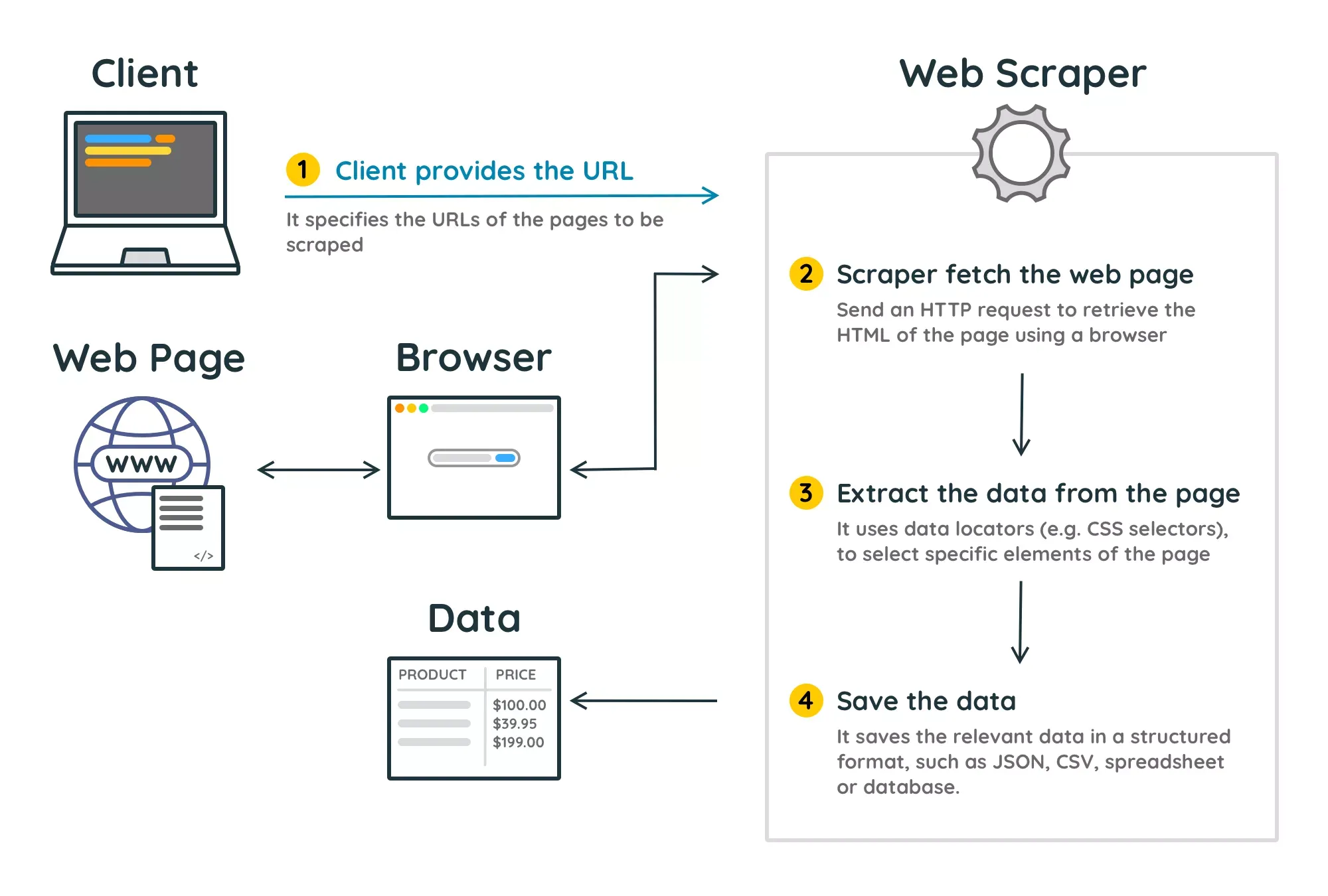
When and why should I use a Web Scraper to extract data?
Ideally, you should use a web scraper when you need to automate your data analysis process or when you want to build software that makes use of a large set of data collected from specific sources, including websites, forums, and social media platforms. Unless you have access to third-party APIs that provide the data you need, automated web scraping is a cost-effective and efficient alternative to manual data collection.
Below, I'm presenting some use case scenarios of web scraping usage.
Competitive Intelligence
Another benefit of web scraping is the ability to gather competitive intelligence. By extracting valuable data and information about your competitors, including their products, prices, and marketing strategies, you can also identify new market opportunities and track industry trends. This can help you gain a competitive edge and make better-informed business decisions.
Price Comparison
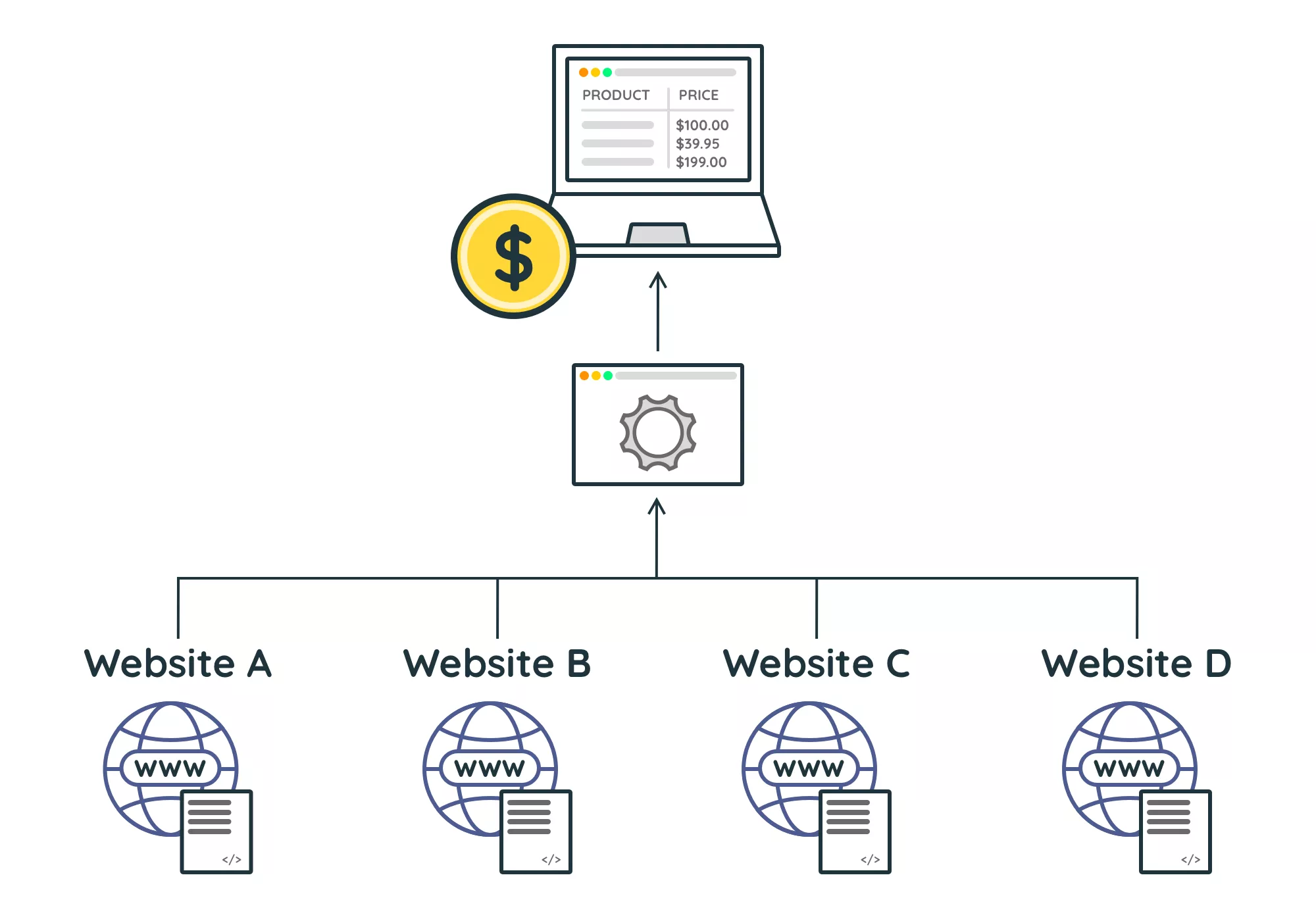
Web scraping is a great way for consumers to find the best deals and lowest prices but also a tool for e-commerce businesses. By gathering pricing information from multiple websites or providers, and presenting the most cost-effective options to users, price comparison websites can help consumers save money. They can acquire the data through direct feeds from merchants using APIs or from third-party API data feeds, but if these options aren't available, web scraping is used as a means to extract the necessary information.
E-commerce businesses can also benefit from web scraping by collecting data on product information and pricing from competitors' websites. This allows them to gain insights into the pricing strategies of their competitors and make data-driven decisions to stay competitive in the market. This is known as pricing intelligence and is essential for any e-commerce strategy. By keeping an eye on the competition and adjusting their prices accordingly, businesses can increase their chances of success in the ever-changing e-commerce landscape.
Lead Generation
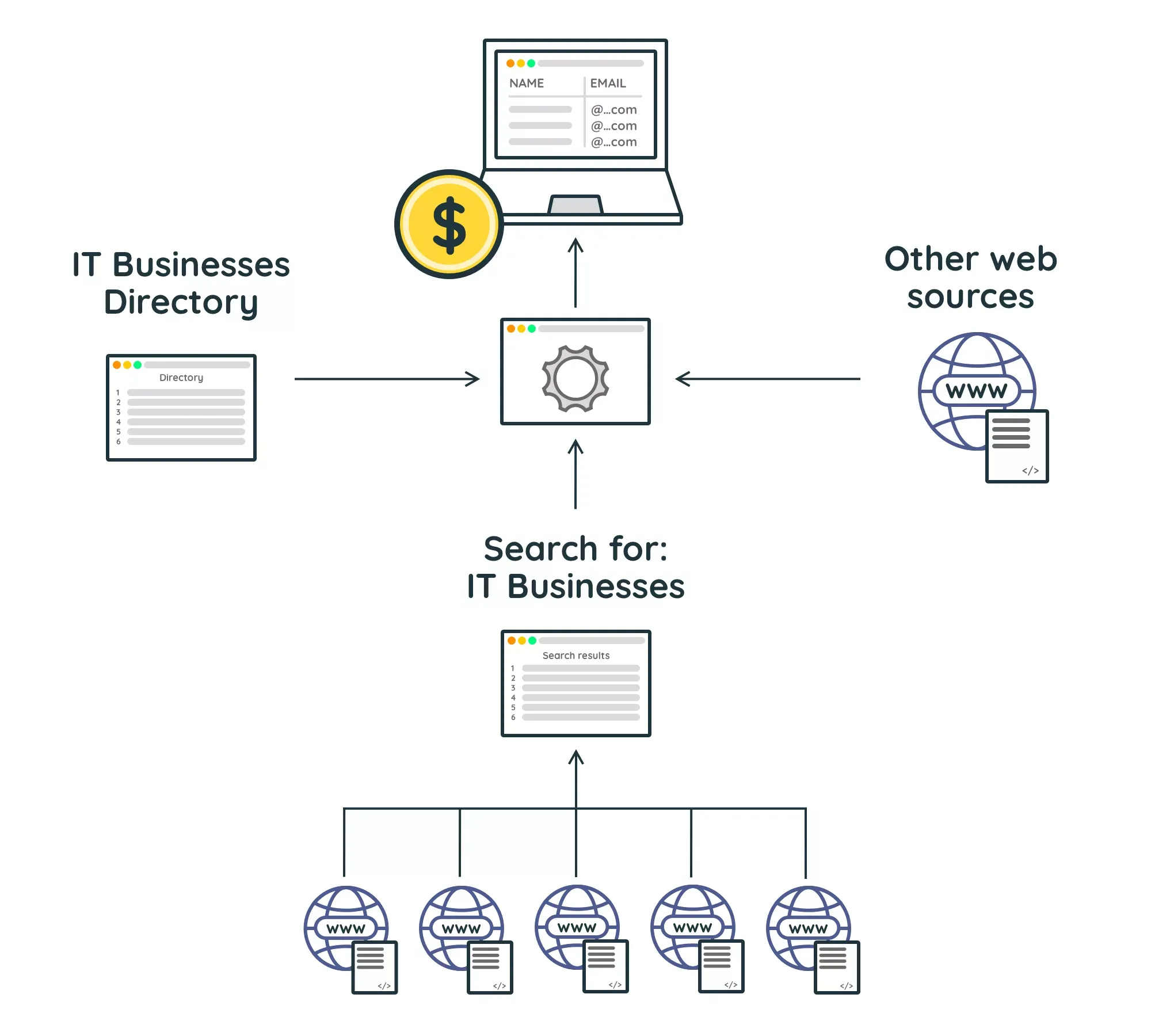
Another popular use case for web scraping is lead generation. Businesses can build targeted lists of potential customers by scraping contact information from websites. This can be especially useful for B2B companies looking to expand their customer base.
Brand and Social Media Monitoring
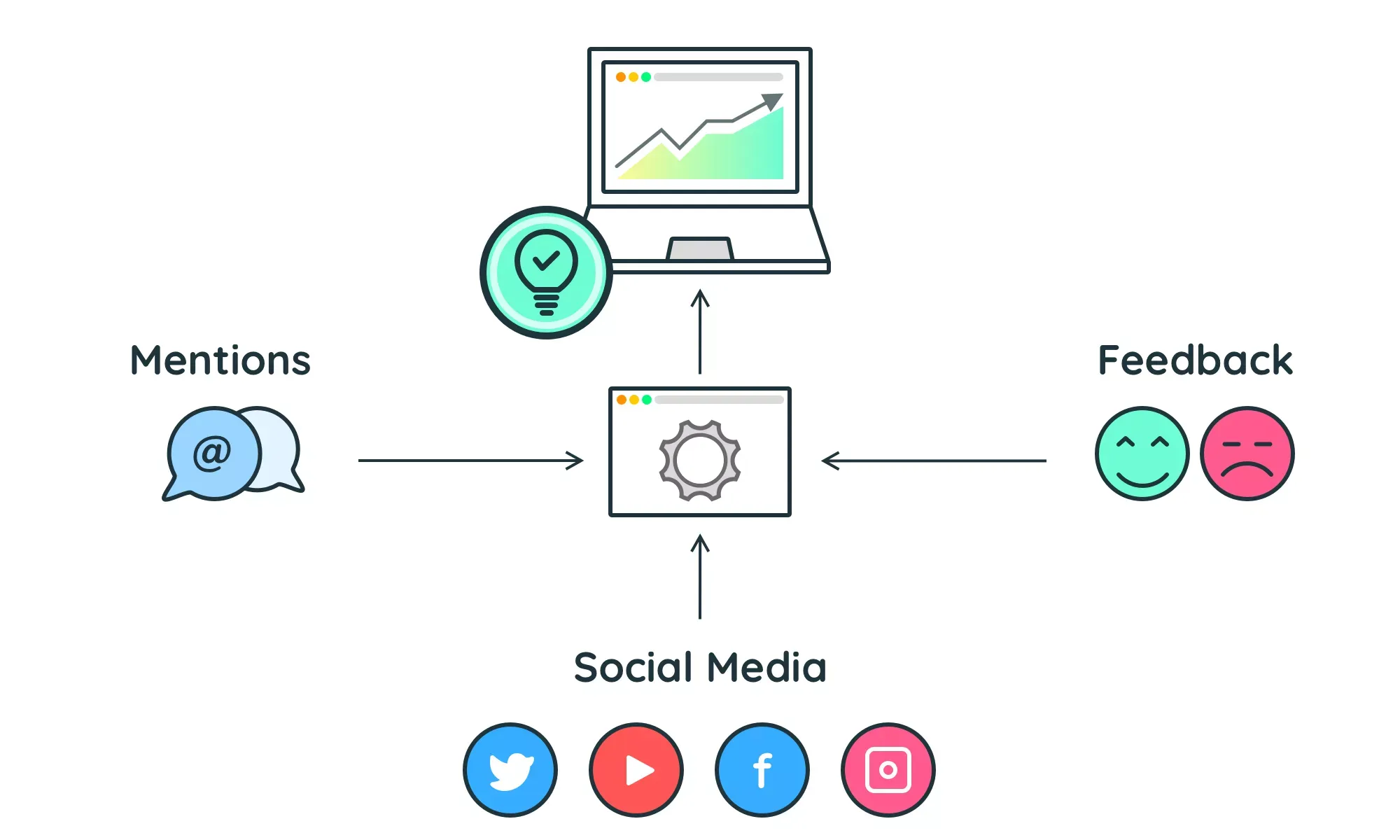
Web scraping can also be used for brand monitoring. By collecting data from social media and review sites, you can track mentions of your brand and respond to any negative feedback.
By scraping data from social media, businesses can gain insights into customer sentiment, track brand mentions and identify influencers. This can be used to improve marketing strategies and make data-driven decisions.
Market Research and Analysis
Web scraping can be used to gather online data for market research. This can help businesses understand consumer trends and make better-informed decisions about product development and marketing strategies.
SEO
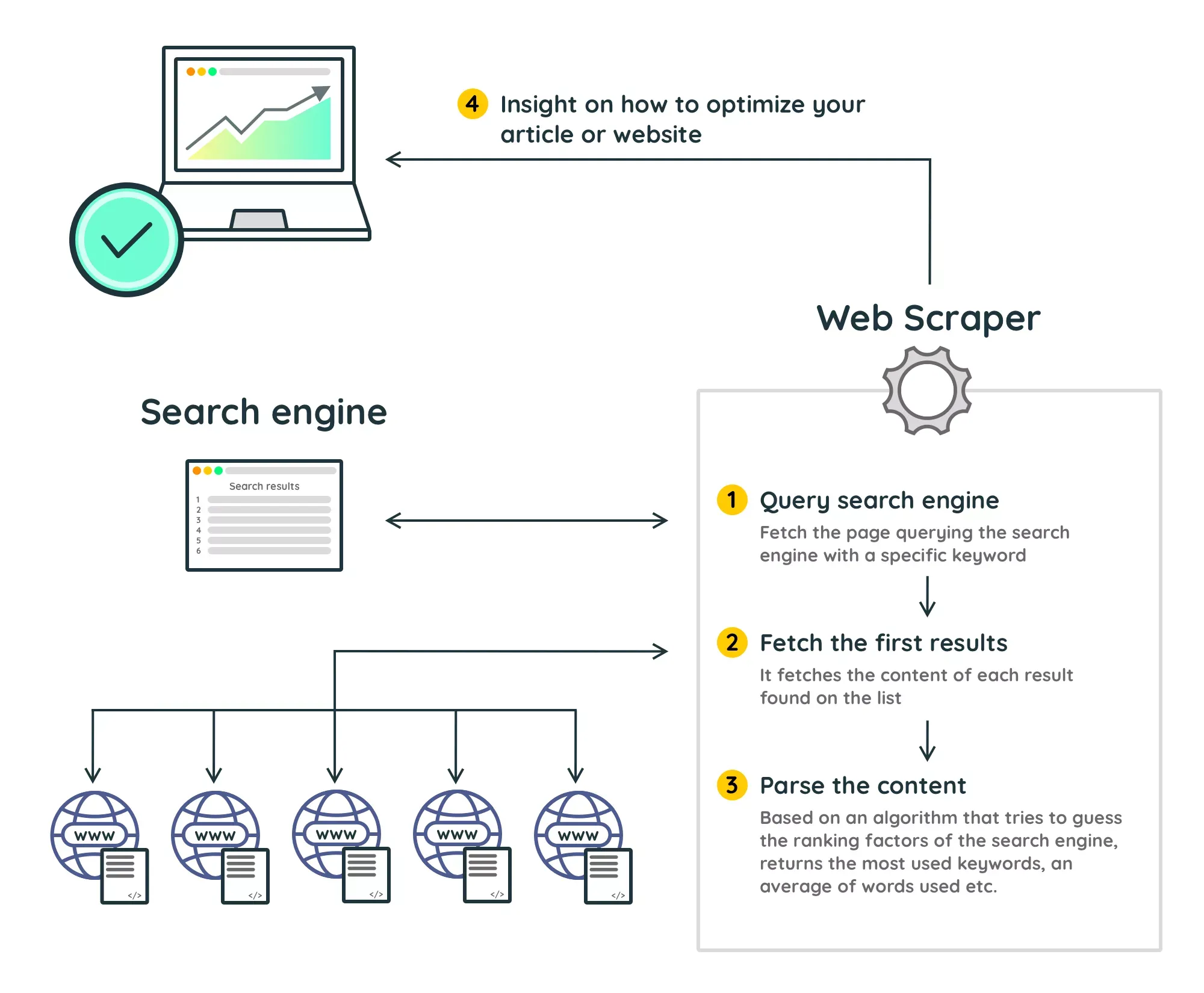
Web scraping can be used for SEO purposes. By collecting data from search engines and analyzing it, businesses and individuals can optimize their websites for better search engine rankings.
As you may already be aware, many businesses have made a fortune by building web scraping tools that analyze the content and backlinks of websites that rank high for specific keywords. Through research and attempts to discern how search engine algorithms operate, they provide insights on how to rank your website or a particular article above your competitors. Some of them even offer a content editor that will tell you what keywords to use and how many times to use them in your heading tags (H1, H2, H3, H4, H5, H6) and within your paragraphs, as well as how many words, paragraphs, heading tags, and images should be in your content.
These tools tend to be costly and come with limitations on the amount of optimized content you can write per month unless you pay additional fees. Usually, the most expensive tools are also the ones that, based on user reviews, are the best at producing good results and guessing how search engine algorithms work.
Here's a tip for you: With the rising popularity of AI tools like ChatGPT and OpenAI APIs, you could start integrating them into your own web scraper and build your custom SEO solution at a fraction of the cost. Additionally, you could even monetize your software.
Machine learning models
Machine learning models can be used in a variety of applications, including natural language processing, image recognition, and predictive analytics.
One method of obtaining data for these models is through web scraping.
This technique can be used to collect data for training and testing machine learning models. Additionally, web scraping can also be used to consistently monitor websites for new data and update models accordingly.
The Benefits of Web Scraping
Web scraping offers several benefits over manual data entry, including:
- Speed: Web scrapers can fetch data much faster than a human could.
- Volume: Web scrapers can collect large amounts of data, making it possible to gather data on a scale that would be impossible with manual data entry.
- Automation: Web scraping can be automated, allowing you to fetch data regularly without having to manually enter the data each time.
The Importance of Quality Web Scraping
As web scraping becomes more prevalent, it is important to ensure that the data being collected is of high quality. Poorly designed web scrapers can lead to incomplete or inaccurate data, which can negatively impact business decisions. To ensure quality data, businesses should invest in robust web scraping tools and techniques, such as using proper data validation and cleaning methods.
Another important aspect to consider is the legality of web scraping. Many websites have terms of service that prohibit scraping, and businesses should take steps to ensure they comply with these terms. This can include using proxy servers to mask the IP address of the scraper and respecting website owners' requests to stop scraping their sites.
Chrome browser extension vs software for Web Scraping
In this comparison, I am referring to software as specific programs running on a server or desktop operating system, even though Chrome extensions can be considered as software that runs within Chrome and take advantage of its APIs.
When it comes to web scraping, using Chrome extensions, whether pre-made or custom-built, comes with certain limitations.
The intention is to scrape web pages, and depending on the level of customization required to achieve the desired goal, a browser extension could be a viable option for your web scraping project.
However, to accomplish a specific task within a short amount of time, it might be necessary, for example, to scrape different web pages simultaneously from multiple IP addresses using proxies or distributing the software across various servers.
Given this example, and other challenges that may arise, the complexity of the software increases and pre-made or custom-built software may be more appropriate.
Web Scraping software and APIs vs Self-built Web Scrapers
When evaluating if it's better to build your custom web scraper, take advantage of third-party APIs or use pre-made software, you first need to answer a few questions:
- Does the pre-made software have features that meet my requirements?
- Is the pre-made software suitable for long-term use or will customization be necessary?
- How long will it take to have web scraping tool up and running and fully integrated with my data collection process?
- Do I have the necessary skills to build my custom web scraping software or do I need to hire developers?
- As a developer, is it beneficial to utilize available paid services and APIs during the software building process?
- Am I comfortable with facing and solving any challenges that may arise during the development process?
- What is the cost of each solution?
- Do I plan to monetize the work?
When it comes to creating a custom web scraper, it's crucial to weigh your options and consider all the important factors.
While using pre-made software might save you time and money, it may not have all the features you need or be a long-term solution. On the other hand, building a custom web scraper may take more effort and resources, but it allows you to tailor it to your specific requirements.
Today, there are many cloud-based web scrapers and services available that can save time and money. These tools have already implemented various solutions to overcome challenges such as bypassing web scraping protections on certain websites, solving captchas, and mimicking human behaviour.
If a new web scraping or bot detection tool is released, these services will handle it by implementing new techniques to bypass them. However, it's important to note that most of these techniques will be discussed on this website and linked in this article.
Additionally, it's essential to consider the overall cost and resources required for each solution and whether or not you plan to make money off your work.
Web Scraper Chrome extension
Web Scraper is a popular Chrome extension for data scraping. It has a simple point-and-click interface that allows you to easily navigate and extract web data from specific pages. It is user-friendly, well-documented and has many features. I recommend watching the 5-minute introductory video on the Chrome web store page to understand how to use it.
Even if you plan to create your own customized Chrome extension or software, I suggest trying this extension first as it can help you understand the concepts of navigation structure and data locators/selectors. Plus, since it runs on your browser, you can see the task being accomplished in real-time.
You can download and install the extension from here.
What is the best language for Web Scraping?
Python is widely considered the best programming language for web scraping. Furthermore, it is one of the most used programming languages overall, according to the 2022 Stack Overflow survey. The advantage of Python over other languages is the massive amount of web scraping libraries available at its disposal.
If you are already familiar with another language, in most cases, you don't need to worry about learning a new language just because you want to build a web scraper.
Please check the article: "What is the best language for Web Scraping and Why?" to find out more.
What's the difference between Web Scraping and Web Crawling?
Web Scraping is the process of extracting specific information from specific pages. While Web Crawling is the process of using bots to read and store all the content on a website for archiving or indexing purposes.
A Web Crawler typically goes through every page of a website, by following all the links it finds, rather than only a subset of pages.
In summary, even if the two processes look really similar, while a Web Crawler scans and extracts all the data on a website, Web Scraping has a more specific approach and goal.
Is Web Scraping slow?
Web scraping is generally considered to be a slow task, but the speed of the process can vary depending on various factors.
For instance, the process of extracting data from a large e-commerce website, could take hours, days or even more using only one computer and internet connection.
To improve speed and address some of these challenges, one common solution is to distribute the workload across multiple servers. This is similar to using multiple computers, each with its own internet connection, to run multiple web browsers and collect web-scraped data simultaneously.
How do I learn to scrape data from a website?
Your journey to learn data scraping has begun! To start, you can use the Web Scraper Chrome extension or create your own web scraper.
If you know JavaScript and you want to learn how to write your own web scraping code, you should start by reading our guide: "How to build a web scraper using NodeJS" (coming soon).
